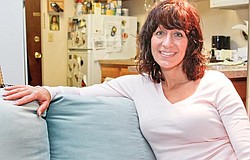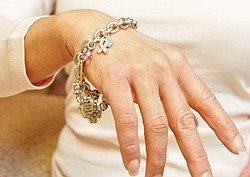THINKING PINK
SURVIVOR: Judy Castranova of Hubbard, a breast-cancer survivor, said she regularly buys “pink” merchandise to benefit breast-cancer research.
SYMBOL OF LIFE: Castranova models a charm bracelet with a breast-cancer symbol. October is Breast Cancer Awareness Month, and Castranova said her self-exam might have saved her life.
According to statistics from the Susan G. Komen Foundation, one in eight women will face breast cancer during her lifetime. Ohio ranks 34th in breast-cancer incidence rate and fourth in mortality rate.
kDeathS per 100,000 women
United States: 24.3
Ohio: 27
Mahoning County: 34.2
Trumbull County: 28.8
Columbiana County: 28.3
Source: Susan G. Komen Foundation
Beware of false marketing, cancer advocate warns
By Elise Franco
Ohio ranks fourth in the U.S. in the death rate for women with breast cancer.
Supporters of breast-cancer awareness may jump at the chance to buy “pink” products, but a Susan G. Komen Foundation representative said some of these products could be marketed largely for a company’s gain.
Sophie Sureau, executive director of the foundation’s Northeast Ohio affiliate, said the foundation works with many big-name companies such as Yoplait, Ford and General Mills.
Sureau said it’s important to support the cause, but it’s also important — especially during Breast Cancer Awareness Month in October — to watch out for organizations that don’t clearly state a minimum donation on their product.
“It’s called ‘Pinkwashing,’” she said. “I think more and more, people have the impression that just by buying something pink they’re supporting our cause.”
Sureau said many for-profit organizations will market pink items and donate only a few cents or dollars to the foundation. Many consumers don’t realize this and believe the money they’re spending benefits the foundation, when really the company pushing the product reaps most of the benefits, she said.
“We will not lend our name to companies that are not there for the purpose of saving lives,” Sureau said. “They must have the same vision and intention in mind, which is not necessarily to boost their sales.”
Sureau said that nationwide, General Mills will contribute $2.25 million to Komen for the Cure, and Yoplait will donate 10 cents per pink lid mailed in with a minimum donation of $500,000 up to $1.5 million.
“Consumers expect that corporate America will give back to the cause,” she said. “Corporate support earns their trust in a cause, and studies show that helps eight in 10 consumers choose their products.”
Sureau said consumers have many options to support the cause on the local level as well.
In April, Rosetta Stone Cafe on Federal Plaza in Youngstown had a karaoke night once per week with the proceeds from special “pink drinks” going to Komen for the Cure, said owner Greg Sop.
Sop said his reason for getting involved was personal.
“As a restaurant, we’ve been very supportive of many different organizations and fund-raising efforts, but for me, it was because I had an aunt who was 45 and died of breast cancer two years ago,” he said. “I think it’s something that’s very widespread, and everyone is touched by it in some way. Even if you’re not a victim of it yourself, you know somebody.”
Kim Cool, marketing director of Wellness One in Warren, said the business is also getting involved in the fight against breast cancer.
Cool said that throughout the month of October, new patients can stop in for a $25 exam. She said 100 percent of the proceeds will be sent to the Susan G. Komen Foundation. So far, this fundraiser has raised $500.
“I lost my aunt to breast cancer, so it’s always been a fight for me,” Cool said. “I thought it would be something that’s good for our office, and hopefully it starts to grow. It’s in its infancy this year.”
One woman who fully supports the cause is Judy Castranova, diagnosed with breast cancer in 1998.
Castranova, 50, of Hubbard, said she buys “pink” products regularly and thinks the extra push in October may help remind women to get checked.
“People get lax in everyday life,” she said. “At least when October comes around, it makes women think, ‘Did I check my breasts? I need to get on it.’”
Castranova said her self-exam and early detection may be what saved her life.
“I found a lump myself, and two days later I went to the doctor,” she said. “Two days after that I went for an ultrasound. I knew right then it was breast cancer.”
That day, Castranova said, was the first day of a turning point in her life.
“I went through a bilateral mastectomy and chemotherapy,” she said. “I lost my hair and had implants put in. It was a really unique experience.”
Sureau said early detection and self-examinations are vital — especially in Ohio, which ranks fourth in mortality rate for women with breast cancer.
She said the United States’ death rate is 24.3 women out of every 100,000. In Mahoning County, that rate is 34.2.
“The statistics are very alarming in that region,” Sureau said. “Women should not hesitate to get checked out, and if they should have questions, they can call us at our office and we can refer them to the right resources.”
Jill Townsend, breast health navigator for Humility of Mary Health Partners, said Ohio’s high mortality rate could be because women aren’t checked early and often.
“My gut instinct would tell me that women in this general area just don’t go for screenings when they should,” she said. “It’s detected later than it would be if regular screenings would occur.”
Townsend said women, especially those who live close to the poverty level, should be aware of the options available to them.
She said the American Cancer Society in Canfield provides free mammograms for women 40 and older who can’t afford to pay, and HMHP provides financial-assistance programs.
“There are resources out there. Unfortunately, enough women don’t know about them,” Townsend said. “I think in our area, we have a large population who are uninsured or under-insured, and so these programs help provide that care for women who couldn’t get it otherwise.”
Castranova said her job as a nurse is what kept her so informed and prompted her to schedule doctor visits so soon after finding the lump.
Cancer-free for more than 10 years, Castranova said she’s become a sort of mentor to other women who have been diagnosed.
“I think because I did so well with it, my name got out there and people remember that,” she said. “I get calls all the time from people. My doctors have called me asking me to talk to women who are going through the same thing, and I’m more than willing to spend the time with them.”
For information on breast screenings, contact the American Cancer Society at (800) 227-2345, Center for Breast Health at Northside Medical Center at (330) 884-2200, Trumbull Memorial Hospital at (330) 841-9481 or Humility of Mary Health Partners Health Line at (330) 480-3151.
For a full list of Susan G. Komen Foundation sponsors or for more information about the fight against breast cancer, visit ww5.komen.org.
efranco@vindy.com
 43
43


